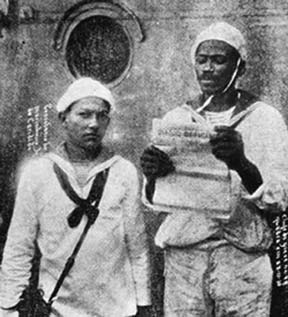
July 2011
to Defeat the Militarized Popular Front
By Military Firemen in Rio de Janeiro
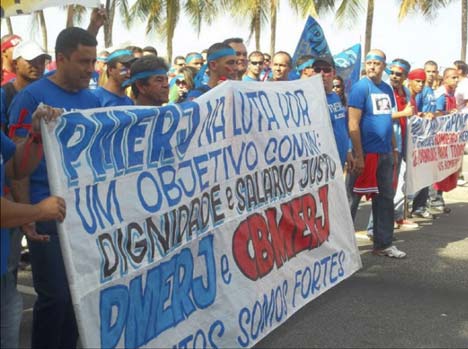 Militarized police and firemen
march together in June 12 parade along
Copacabana beachfront. The militarized
firemen are also auxiliary forces of the
repressive apparatus of the bourgeois
state. (Photo:
SOS Bombeiros)
Militarized police and firemen
march together in June 12 parade along
Copacabana beachfront. The militarized
firemen are also auxiliary forces of the
repressive apparatus of the bourgeois
state. (Photo:
SOS Bombeiros)JUNE 30 – The occupation of the headquarters of the Military Fire Corps of the State of Rio de Janeiro by striking firemen on the night of June 3 not only unleashed a clash with the authoritarian state government of Sérgio Cabral Jr., but also a political struggle inside the workers movement. The main tendencies to the left of the governing Workers Party (PT) of Luiz Inácio Lula da Silva – namely the Party of Socialism and Freedom (PSOL) and the United Socialist Workers Party (PSTU), particularly the latter – are ostentatiously backing the movement of the Rio firemen. As the leading forces in the teachers union of Rio de Janeiro (SEPE-RJ), they have linked a strike at schools in the Rio state network to the action of the militarized firemen (bombeiros militares, their official title). However, intervening in union assemblies and with a leaflet, the Comitê de Luta Classista (CLC – Class Struggle Caucus), linked to the Liga Quarta-Internacionalista do Brasil (LQB – Fourth-Internationalist League of Brazil), has sharply criticized the posture of the leadership for feeding dangerous illusions in these auxiliary forces of the repressive apparatus of the Brazilian state.
The repression of the firemen by Rio’s “governator” is typical for this politician who likes to present an iron-fisted image, and of the coalition state government of his PMDB (Party of the Brazilian Democratic Movement) and the PT which he leads. Fearing that elements of the Shock Brigade (of the militarized state police) might refuse to repress their firemen “comrades,” Cabral sent the Special Operations Battalion (BOPE), to carry out an operation like those in the movie Tropa de Elite (Elite Squad), using tear gas, percussion grenades and rifle fire. Some 439 firemen were jailed in the largest mass arrest in the city’s history. He also denounced the mutinous firemen as “cowards, vandals and irresponsible criminal elements.” In response to the arrests, a front was formed of parliamentary parties from right to “left” which introduced bills to the state and federal legislatures to amnesty the militarized firemen. The authors included conservative PR (Republic Party) spokesman and former Rio state governor Anthony Garotinho, as well as leaders of the PT and PSOL (Chico Alencar), the right-wing Democrats and the social-democratic Partido Comunista do Brasil (PCdoB). Even Cabral came out for amnesty.
From 2007 on, the LQB has condemned the bonapartist Cabral for seeking to install a veritable police state and criminalize all opposition. We explained that his government – a “popular front” which subordinates the workers to bourgeois sectors by means of an alliance between the PT, a reformist (pro-capitalist) workers party, and parties of the bourgeoisie itself, in this case the PMDB – had declared war on the unions and the poor. We noted how Governor Kill-’Em-All in Rio was propped up by Lula’s popular-front government in the Palácio do Planalto, Brazil’s White House. Lula sent troops of the elite National Security Force to occupy the hillside slums of Rio using counterinsurgency tactics they perfected while acting as mercenary troops in the imperialist occupation of Haiti. At the same time we warned that the PSTU, which sometimes tries to disguise itself as Trotskyist, was seeking to ally with the Militarized State Police (see “Luta operária contra a frente popular militarizada do PMDB e do PT no Rio de Janeiro,” Vanguarda Operária No. 10, May-June 2008). On marches, in the SEPE-RJ and in the trade-union federation led by the PSTU, Conlutas, the CLC has fought against any participation by the police.
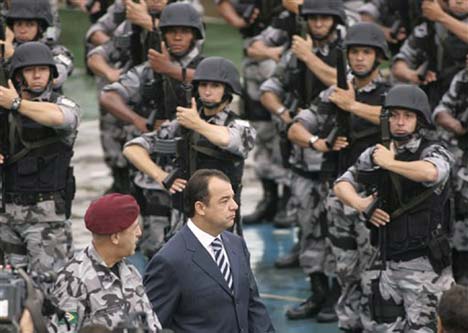 The
"governator" Sérgio Cabral Jr.
reviews the elite police of the
National Security Force, January 2007.
The
"governator" Sérgio Cabral Jr.
reviews the elite police of the
National Security Force, January 2007.
(Photo: Silvia Izquierdo/AP)
Today the scenario is being repeated. The PSOL, which claims to support demilitarization and even disarming of the firemen, doesn’t mention this controversial issue in its amnesty motion. Meanwhile, these ex-PTers support the “just struggle of the Rio firemen” to raise their salaries to the level of the militarized police (PSOL-RJ statement, 6 June). The PSTU has been even more enthusiastic, with a flamboyant exhibition on its web site on “The Days In Which Rio Was Painted Red” (the color of the “striking” firemen). It distributed thousands of stickers with the slogan, “We Are All Firemen.” The PSTU proclaims, “A red tsunami takes the city and spreads over the state.” It foresees that the present situation could advance to the point where it gives rise to a “Cabral Out” movement.[1] In the June 12 demonstration by the firemen (and militarized police) along the Copacabana beachfront, which they put at 50,000 participants, Rio PSTU leader Cyro Garcia declared that “the winds of North Africa and Europe are beginning to blow here.” A reader might conclude that the city was about to explode with class struggle. So are we going to have barricades in the squares in the coming days?
The “red tsunami” not only swept with it the reformist PSOL and PSTU, which openly support capitalism, but also various centrists who combine pseudo-revolutionary rhetoric and a practice which doesn’t infringe on the bourgeois order. Most notably in this respect, the Partido Causa Operária (PCO – Workers Cause Party) called on working people to “completely support the struggle of the firemen” (Causa Operária, 12 June). The PCO labeled the BOPE “fascist,” citing the attack on the Fire Corps headquarters as proof. It rightly criticizes the PSOL for praising the Pacification Police Units (UPPs) which have placed various Rio favelas (slums) “under a state of siege.” It mouths a few words about demilitarizing the firemen, but neglects to mention that the firemen’s struggle is for their conditions to be closer to those of the other “auxiliary military forces,” the militarized state police. And why don’t they comment on the fact that these same firemen participate in imposing the UPPs, as they recently did in the occupation of the Mangueira slum district?
“The action was coordinated by the Secretariat of Security, by the Militarized and Civil State Police, with the support of the Brazilian Navy (the Marine Corps), the Federal Police, the Fire Corps and the Public Defender’s office.”
–O Globo, 20 June
At the same time, a tiny Coletivo Lenin, despite its orthodox Trotskyist pretensions, followed the example of the PSTU by writing, in a June 11 note on its blog, that “All working people and combative youth of the city should unite in solidarity with the rebel firemen.”
Other centrists criticize the PSTU for its support for the firemen. The Liga Bolchevique Internacionalista (LBI) writes, in a June 6 note on its site, that “we cannot support the demands of the firemen’s movement.” It prioritizes the demand for demilitarization of the Corps, noting that its military character derives from clauses of the 1988 Constitution (Article 144). It criticizes the “offensive against the poor population of the favelas” by the Cabral government, but is silent about and doesn’t explain how the firemen are part of this. Nor does it mention the main auxiliary military function of the firemen: the heavy participation of militarized firemen in the Rio “milicias,” that is, in the extra-official death squads which terrorize the hillside slums. In reality, the LBI would like to support the firemen if the latter would only change their demands a bit.
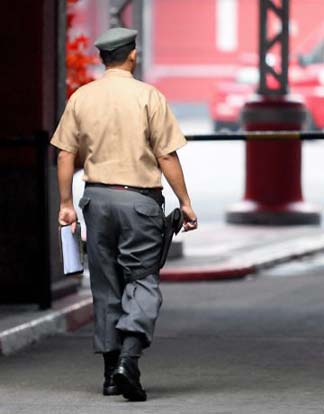
Armed
fireman in the Corps headquarters in
Rio de Janeiro, July 2008.
(Photo: Marcelo
Carnaval/O Globo)
The Liga Estrategia Revolucionária-Quarta Internacional (LER-QI, Revolutionary Strategy League – Fourth International), part of the Trotskyist Faction (FT) led by the Argentine Socialist Workers Party (PTS), has taken a harder stance against the firemen’s “strike.” The LER’s 5 June declaration was titled, “No Support to the Repressor Sérgio Cabral or to the Firemen’s Mutiny.” It points out that the firemen want to continue to be auxiliary military forces, demanding salaries equal to those of the militarized police; it mentions the connection of the firemen to paramilitary actions (like the 1981 bomb attack on the Riocentro convention center) and that they are “the backbone of those who kill, repress and extort from various communities in the state.” What, then, is the proposal of the LER? “The PSTU and Conlutas must take the lead in organizing the struggle against capitalist exploitation and state repression, which means not defending institutions of repression but instead to fight for the dissolution of all organs of repression….” Everywhere and always, the LER’s watchword is to make the PSTU/Conlutas fight.
In this manner, the LER functions as a pressure group on a reformist party and the union federation it leads, which only seek to modify capitalism rather than bringing it down. This empties the LER’s more radical calls of any value, because it is perfectly obvious that the PSTU and Conlutas are not going to break the framework of bourgeois rule. With its perspective of a bourgeois “democratic revolution” – a legacy of the PSTU’s mentor, the late Nahuel Moreno – the Morenoites of our day, by rejecting proletarian revolution, tail after distinctly anti-democratic forces … like the police. This is not just a political choice: the social base of the PSTU is in the trade-union bureaucracy, whose job is to control the ranks by seeking an accord with the bosses, while the PSOL is based on the elected officials of the bourgeois parliamentary system. Even though the LER and the FT make posthumous criticisms of Moreno and say they have broken with Morenoism, in practice they follow the same “democratist” political line. In Argentina, the PTS has just formed a Left and Workers Front on the basis of a reformist electoral program – a typical propaganda bloc, which if it prospers would be the doorway to a popular front.
In many counties, firemen, even though they may feel close to the police in the sense of being part of “uniformed services,” are distinct entities. The police are part of the “special bodies of armed men” who constitute the backbone of the capitalist state; they are professional repressors. Firemen fight fires and give aid – they are not armed. In Mexico during May Day parades, the police are booed while the firemen (part of the civil administration) are cheered. In Brazil also, many see the firemen as lifesavers. That’s why their propaganda in which they proclaimed themselves heroes had an impact.
However, reality is different. In particular during the military dictatorship that lasted form 1964 to 1985, the corps of firemen were put under the command of the militarized state police and participated in the repression. Even after the fall of the dictatorship, they were designated as “military forces, an Army reserve.” Concretely, the “Military Fire Corps of the State of Rio de Janeiro” has since 1995 been under command of the Secretariat of Public Security, its members are soldiers of the state military forces (as is also the case with the militarized police) with military ranks (private, corporal, sergeant, captain), they are commanded by colonels and subject to military discipline.
The military character of Brazilian firemen is not only a question of laws and regulations. They receive military training. One third of the Rio corps, more than 5,000 firemen, is officially armed – “a small army,” as O Globo (19 June) noted. Moreover, they are authorized to have up to three arms (a revolver, a shotgun and a carbine), whereas the militarized police can only (officially) have two revolvers. And even though they are supposedly prohibited from using them while on duty, these arms are frequently used against the population. Although the government pretends that there is a war between the “forces of law and order” and the militias which kill with impunity in the favelas, no one in Rio is ignorant of the fact that “the paramilitary forces are led, almost entirely, by state public agents: civil police, militarized police, militarized firemen and agents of Desipe (prison officers), as well as by members of the Armed Forces,” as the Final Report of the Parliamentary Commission of Inquiry on Militias in the State of Rio de Janeiro (14 November 2008) concluded. A large portion of those leaders are militarized firemen.
The scope of the bloodbath in the morros, the hillside slums, of Rio is horrifying. Of the 5,000 people killed every year in the state of Rio de Janeiro – a homicide rate without comparison internationally – more than 1,000 are killed by the police, both militarized and civilian, three times as many as in São Paulo. Even though they are classified as “killed while resisting arrest,” the large majority of these deaths are summary executions, according to prosecutors and even some police officials. And almost half (45%) of the other, non-official murders are carried out by the militias (O Estado de S. Paulo, 1 June). We’re not talking here about crimes of passion, gunfights with drug traffickers or rogue cops. What we have here is a whole system for control of the population by the “auxiliary military forces” of the capitalist state. And now the militarized firemen, many of whom form the axis of this system, want to raise their salaries, status and “working conditions” to the level of the militarized police – which would give them greater power to increase their paramilitary domination over the poor who reside in the favelas.
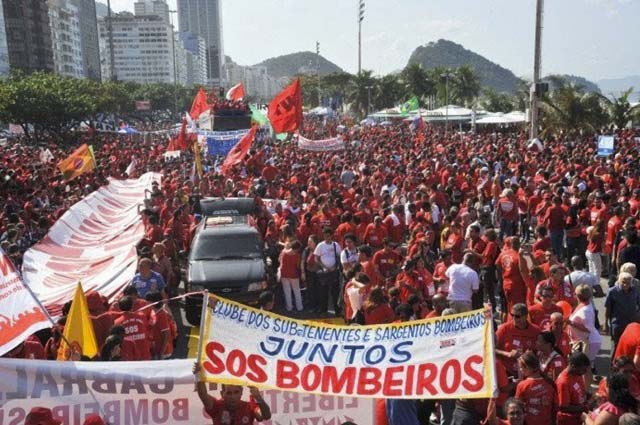
marched with militarized state police and striking teachers, thanks to PSTU and PSOL union leaders.
(Photo: SOS Bombeiros)
Left: PSTU sticker, “We Are All
Firemen.” 
Take a look at the demands of the militarized Rio firemen: they want, first of all, “to return to the Secretariat of Public Security or Civil Defense” (feeling themselves diminished by being assigned to the Secretariat of Health during the campaign against dengue fever). This was immediately agreed to by Cabral, who created a new Secretariat of Civil Defense. Secondly, they want to raise their salaries to the level of militarized police in the Federal District (the capital, Brasília, which has the highest salaries in the country for this sector), which the militarized police in Rio are also seeking. They are demanding that the federal Congress approve the bill for a constitutional amendment (PEC 300), which would inscribe the equalization of all militarized (but not civil) forces in the Constitution. And finally, they want amnesty. The mass arrest of the firemen by Cabral was a bonapartist measure which could later be used against the working class, constituting a threat to democratic rights in general. However, the amnesty which they are pushing for goes beyond this: it would add a new article to Federal Law 12.191 of 2010, which amnestied militarized police and firemen in their “labor” movements from 1997 to 2010, extending this to include any action by these military forces during 2011. This would be a carte blanche stimulating bonapartist actions by these military forces, as occurred in 1997.
Is it possible that the Brazilian parliament would concede such an amnesty to any sector of working people? It’s inconceivable. The reason for the almost unanimous agreement by the bourgeois parties to the amnesty law is that they recognize that they depend on the military and paramilitary forces, which are the backbone of the capitalist state and which they view as essential in order to maintain their class rule over the working people and rural and urban poor. Some sectors would still like to “demilitarize” the corps of firemen and even “disarm” them. This was the proposal by Rio state deputy Marcelo Freixo (PSOL) and of the Final Report of the commission of inquiry on the militias which he led. However, the bills embodying this have gone nowhere. Even if the militarized firemen were separated from the militarized police, this would be no guarantee that the function of the firemen as an auxiliary military force, which is largely based in their extra-official positions of leadership, would change.
The “strike” of
the Rio de Janeiro firemen is not
a movement of workers against the
employer-state as part of the class
struggle against capitalist rule, but
instead represents an effort by a sector
of the repressive apparatus to improve its
position and remuneration as an “auxiliary
military force” of capital, distinct from
civilian public employees and in
conjunction with the militarized police
and even with the top commanders of the
Corps. If anyone had any doubts about the
reactionary
nature of the movement, all you have to do
is cast a glance at the banners in the
demonstrations which proclaim,
“Militarized Police and Firemen United”
and consider the fact that the leaders of
the firemen’s movement, who are officials
(captains) rather than soldiers, joined
with the militarized police to form a
“United Front of Public Security
Entities.”
Trotsky: “Policemen Are Ferocious, Implacable Enemies”
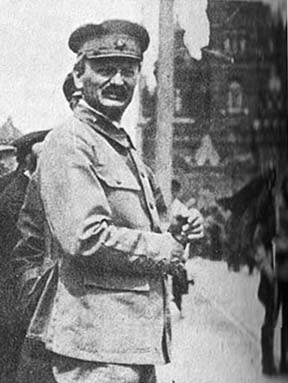 Leon Trotsky, in Red Square,
Moscow, 1920. Trotsky wrote of Germany:
“The
worker who becomes a policeman in the
service of the capitalist state, is a
bourgeois cop, not a worker.”
Leon Trotsky, in Red Square,
Moscow, 1920. Trotsky wrote of Germany:
“The
worker who becomes a policeman in the
service of the capitalist state, is a
bourgeois cop, not a worker.”
In its first congress in July 2008, Conlutas (led by the PSTU), seeking to distinguish itself from the CUT (Single Union Federation, a principal support of the governing PT), and following the failure of its projected fusion with the Intersindical labor federation (led by the PSOL and other left currents), baptized itself “a combative, class-struggle coordinating body.” It’s a curious idea of “class struggle” that includes the members of the repressive apparatus of the capitalist state as part of the proletariat. It’s not just a matter of the militarized firemen: the PSTU and Conlutas have for some years avidly sought to unionize the police “sector,” both civil and militarized. So avidly, in fact, that “unions” and associations of police participated in the Conlutas congress, and the PSTU defended their presence tooth and nail on the pretext of “represent[ing] the whole of the working class.” Against this dangerous and treacherous thesis, the Comitê de Luta Classista insisted in its founding program (1997): “Trade unions belong to the working class, not to the bourgeoisie and its agents… police (of any sort) are not part of the working class, they are the armed fist of the bourgeoisie.”
Immediately following the formation of the CLC, this fundamental point of its program proved to be of great current importance in the face of “strikes” by the military police and firemen in 1997 throughout the country. The PSTU bragged of having ostentatiously supported this “rebellion” in Belo Horizonte, where it was led by the Shock Battalion of the Minas Gerais militarized state police, which was “accustomed to repressing our strikes” (Opinião Socialista, 3 July 1997). These Morenoites made a shameful appeal for unity between these “workers in uniform” (the military police!) and “their unarmed brothers”. Other reformist tendencies did the same. Combate Socialista (25 June 1997), a Morenoite current inside the PT (now part of the PSOL), proclaimed: “Total Support to the Strike of the Minas Police.” O Trabalho, another pseudo-Trotskyist current (followers of the late Pierre Lambert) in the PT, counted the leader of the “union” of civil police of the state of Alagoas in its ranks. The ex-Maoist PCdoB campaigned in the UNE (National Student Union, which it has controlled for years) on the watchword, “The people and police united, will never be defeated,” at the same time as it called for disarming the population.
Against this support to the police mutiny, the Liga Quarta-Internacionalista declared: “No to coalitions with the bourgeoisie and its police!” (Vanguarda Operária No. 2, August-October 1997). We said loudly that “the militarized police are enemies of the working class and we fight for the removal of all sorts of police from the CUT.” We quoted the words of the great Bolshevik revolutionary Leon Trotsky, which we had already published in the first issue of VO, warning against illusions in the working class about the German police on the eve of the taking of power by Hitler’s Nazi fascists:
“The fact that the police was originally recruited in large numbers from among Social Democratic workers is absolutely meaningless. Consciousness is determined by environment even in this instance. The worker who becomes a policeman in the service of the capitalist state, is a bourgeois cop, not a worker.”
–What Next? Vital Questions for the German Proletariat (January 1932)
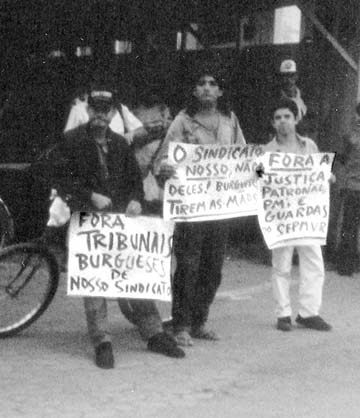 July 1996,
Volta Redonda municipal workers made
history by voting to drop police from
membership in the union (SFPMVR).
Signs say: “Bourgeois Courts, Hands
Off Our Union,” “Bosses' Justice,
Militarized Police and Municipal
Guards – Get Out of the SFPMVR.” (Photo: Comitê de Luta
Classista)
July 1996,
Volta Redonda municipal workers made
history by voting to drop police from
membership in the union (SFPMVR).
Signs say: “Bourgeois Courts, Hands
Off Our Union,” “Bosses' Justice,
Militarized Police and Municipal
Guards – Get Out of the SFPMVR.” (Photo: Comitê de Luta
Classista)
Recently, various centrist groups have reproduced the same quote. While they only use Trotsky’s words in order to pressure the PSTU or PCO, we sought from the beginning to put into practice the Trotskyist program. In July 1996, the Union of Public Employees of the City of Volta Redonda (SFPMVR) in the state of Rio de Janeiro, led by several comrades of the recently founded LQB, made history by disaffiliating policemen (municipal guards) from the union. For this genuinely class-struggle action, they were sharply repressed by the bourgeois courts, aided by the whole of the left, including the PT, PCdoB, PSTU, LBI, Causa Operária and other left tendencies.
Currently, in order to justify its ruinous policy of embracing the “strike” by the militarized firemen of Rio, the PSTU published a lengthy article (written by its main leader, Eduardo Almeida, and a colleague) attacking the LER-QI, “Polemic: Why It’s Correct to Support the Struggle of the Firemen.” In this text, the PSTU claims that its support for these auxiliary military forces is an expression of the military strategy of the Third (Communist) International to “split the bourgeois armed forces before the insurrection.” Today, in contrast to its position in 1997, the PSTU accepts that, “Obviously the police are not part of the proletariat and work in a repressive instrument of the bourgeois state, part of the superstructure in the service of the ruling class.” But it immediately adds that, “because they are recruited from the proletariat, the police also sell their labor power and suffer the abysmal quality of life as does any other worker, since they receive low wages” and therefore “they can be split.” In other words, the PSTU wants to split the police by supporting their “strikes,” treating them as if they were workers. This opportunist reasoning is diametrically opposed to the revolutionary position of Trotsky in Germany in the 1930s.
In peddling the fairy tale that its current policies follow those of the Third International of Lenin and Trotsky, the PSTU equates the police with soldiers in the army. Yet there is a big difference between soldiers subject to obligatory military service (conscription), as is the case in Brazil, and police who are voluntarily recruited to an institution of repression. Trotsky himself, in The History of the Russian Revolution (1930), gives a vivid description of the distinction made by the Russian workers between the police and soldiers during the February 1917 Revolution:
“Toward the police the crowd showed ferocious hatred. They routed the mounted police with whistles, stones, and pieces of ice. In a totally different way the workers approached the soldiers. Around the barracks, sentinels, patrols and lines of soldiers stood groups of working men and women exchanging friendly words with the army men.”
Later on in the same chapter, he writes:
“The police are fierce, implacable, hated and hating foes. To win them over is out of the question…. It is different with the soldiers: the crowd makes every effort to avoid hostile encounters with them; on the contrary, seeks ways to dispose them in its favor, convince, attract, fraternize, merge them in itself.”
As we see, in Germany and Russia, Trotsky had the same policy toward the police, and he distinguishes them from soldiers.
What of the militarized police and militarized firemen in Brazil today? It’s one thing to have illusions in the British police, the famous bobbies who had the (never justified) fame of being unarmed. There also we reject any presence of police in the trade-union movement, because they are class enemies of the working people. But in Brazil, a country with innumerable massacres carried out by the Militarized Police, to think that the police are, or should be treated like, “workers in uniform” can lead to deadly misunderstanding. The police are professional repressors: this is the job they carry out, whether in the BOPE, the Shock Battalion or the Militarized Police as a whole. The militarized firemen are, precisely, auxiliary military forces – that is, they aid the militarized police. They aid the Army and the National Security Force which Cabral invited to Rio in 2007 to impose “law and order.” As we already saw in its present “strike,” the Rio fireman are seeking a closer equivalency with their “brother” policemen. On top of this, there is the role of the militarized firemen in leading the militias which keep the Rio slums in a state of siege, which would only be made worse with better wages and working conditions for the Corps.
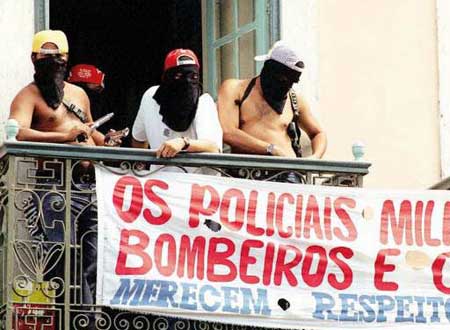 Militarized police and
militarized firemen of the state of
Alagoas on “strike,” July 1997. The PSTU
gave “total support” while the LQB warned
against any support to these professional
assassins. (Photo: Marco
Antônio/AP)
Militarized police and
militarized firemen of the state of
Alagoas on “strike,” July 1997. The PSTU
gave “total support” while the LQB warned
against any support to these professional
assassins. (Photo: Marco
Antônio/AP)
So what then is the alternative? Virtually the entire Brazilian left, both those who support the “strike” (PSOL, PSTU, PCO and other smaller groups) and those who criticize it call for “demilitarizing” the firemen. For some, such as the LBI, this is their main slogan in the dispute; others, such as the LER-QI, give less importance to it. (Interestingly, when a teacher from the SEPE-RJ who is a member of the PSTU dared to pronounce the word “demilitarization” in his speech during the occupation of the steps of the Rio Legislative Assembly, he was rejected by the firemen.) Certainly there is no reason why a civil service such as putting out fires, being lifeguards on the beaches and saving people in danger needs to be a military force. But what does it mean to raise demilitarization of the firemen as a slogan. In the Report on the parliamentary inquiry into the militias, which was unanimously approved by the state Legislative Assembly and forwarded to the federal Congress by Deputy Marcelo Freixo of the PSOL, demilitarization is presented as a measure to regularize and make repression less arbitrary and more efficient in the name of “defense of the Democratic State of Laws.” That does not mean making them any less violent.
Thus the Report proposes: “20. Disarmament/demilitarization of the Fire Corps, in view of the quantity of participation by its members in militia activities, in addition to, as is well known, various other criminal activities above all due to their possession of firearms.” This proposal was preceded by, “11. Creation of a Chamber for Repression of Organized Crime, involving specialized organs of the Civil Police, the Public Prosecutor and Court system.” Also: “16. Enabling the Public Prosecutor to factually and effectively exercise an external supervision of the Police, as well as supervising the whole of the security system.” Yet substituting greater control of the favelas by the official police (which murders with impunity more than 1,000 residents a year), as opposed to the present control by paramilitary groups led by militarized police and militarized firemen, isn’t exactly a step forward from the point of view of the working people. Moreover, this raises the question: who exactly is going to carry out the demilitarizing (and disarming!) of the militarized firemen?
Interestingly, the PSTU, in its main article on the firemen’s struggle, opposes disarming the militarized firemen! “But, pay attention firemen and policemen, demilitarizing doesn’t mean disarming.” So it is announcing that these forces can keep the pistols, shotguns and rifles that are frequently used to intimidate and subjugate the poor people. The PSTU is offering, in its supposed effort to “divide” the military forces, to guarantee the continuation of the rule of the militias in the slums! In any case, even if the law calls for it, the firemen are not about to surrender their firearms, particularly in the present climate of insecurity which reigns in the morros and other neighborhoods of Rio. Nor are they going to peacefully hand over the economic basis of their domination: “sales of gas, alternate means of transportation, and the ‘gatonet’ (cat net, or pirate cable TV service) and … clandestine security services,” as Deputy Freixo said in an interview with O Dia (5 September 2010). This economic power could not exist without a connection with legal enterprises, from the gas agencies to companies like Sky-TV (known as “sky-meow” in the favelas).[2]
In addition to the “demilitarization” preached by the bourgeois and reformist parties, whose aim is to regularize the system of repression, the LER-QI offers a democratist utopia: in its article of 5 June it calls on the PSTU and Conlutas, as usual, to “fight for the dissolution of all organs of repression.” One has to ask: who would dissolve the police repressive apparatus, and how would it perform this feat? In several articles in recent years criticizing the PSTU, the LER simply repeats its call for “dissolution” without further explanation. It thereby implicitly suggests that this could be accomplished without overthrowing the present bourgeois state. But when, in November 2010, in the midst of the massive uproar provoked by the brutal police occupation of the Complexo do Alemão hillside slum, the PSTU came out for “dissolution of the police,” the LER had to admit that this was “as we have always called for,” but insisted, “When this party [the PSTU] calls for dissolving the police it is in order to reform the police.” (“A democratic police is impossible” says an article by the LER of 3 December 2010.) In reality, this is a utopian reformist conception, whether coming from the mouths of the PSTU or the LER.
 The illusion: the PSOL praises
Cabral’s “Pacification Police Units,”
shown here playing with babies in a
nursery in the favela Cidade de Deus
(City of God). (Photo:
Lalo de Almeida/New York Times)
The illusion: the PSOL praises
Cabral’s “Pacification Police Units,”
shown here playing with babies in a
nursery in the favela Cidade de Deus
(City of God). (Photo:
Lalo de Almeida/New York Times)
The PSTU has the virtue of explicitly laying out its view: it wants to “put an end to the present-day police, to investigate and arrest all of its rotten gang, and create a new one. The new police would have to be organized in a radically different way than the present-day one.” There would be no distinction between civil and militarized police (“it serves no purpose”), there would be “more democratic liberties” for the police and “its commanders and officers would be elected by the population where they live” (Eduardo Almeida, “How to Confront Urban Violence?” article by the PSTU dated 27 November 2011). To underline the “realistic” character of its proposal, Almeida writes that “the election of local police chiefs is practiced in many countries, even in the United States”! Yes indeed, and in the U.S. state of Arizona the fascistic sheriff of Mariposa County, who organizes paramilitary bands to hunt down undocumented immigrants, is elected by popular vote. How great a “democratic advance” is that! In the present climate of insecurity and hysteria over “crime” instigated by the bourgeois media and politicians, the program of cleaning up the police and electing their chiefs could lead to legalizing the death squads.
The utopian idea that without bringing down capitalism it would be possible to “dissolve” the repressive military apparatus in Brazil, which serves to brutally subjugate the starving legions despite welfare programs like “Fome Zero” (Zero Hunger), is absurd. In this epoch of decaying capitalism, it will take a social revolution to win basic democratic rights.
Despite the reformist character of the PSTU’s call, the LER-QI responds generously, “The PSTU is attempting to find a theoretical and programmatic solution based on revolutionary tradition.” The LER claims that, “As a lesson from the Commune, the police was dissolved.” Yet this was not the lesson drawn by the great Marxists from the experience of the 1871 Paris Commune. The conclusion drawn by Karl Marx at the height of the Commune was, “the next attempt of the French Revolution will be no longer, as before, to transfer the bureaucratic-military machine from one hand to another, but to smash it.” On the eve of the Russian October Revolution of 1917, Lenin stressed: “The words, ‘to smash the bureaucratic-military machine,’ briefly express the principal lesson of Marxism regarding the tasks of the proletariat during a revolution in relation to the state” (The State and Revolution [August-September 1917]). Alternatively, Lenin spoke of crushing, suppressing, demolishing and destroying the state apparatus by means of revolution, but never of “dissolving” it as if this is something that could be decided by a bourgeois-democratic assembly concerning some secondary state agency.
The PSTU’s recent polemic against the LER begins and ends with the characterization, “a scandalous error.” This is an implicit response to the article by the LER, “The Scandalous Position of the PSTU in Defense of the Police” (Palavra Operária, 23 April 2008). However much they scandalize each other, as we remarked above, they both share the same “democratist” outlook contrary to the struggle for socialist revolution. If the former seek to get along with the murderous police, the latter use the language of bourgeois liberal defenders of “human rights” who are guided by “democratic” imperialism. As against democratic-reformist illusions about demilitarization and dissolution of the repressive organs, the Comitê de Luta Classista (the trade-union tendency linked to the Liga Quarta-Internacionalista) has fought for years to expel any and all police from the unions and to mobilize the power of the unions in defense of the oppressed. Thus in June 2008, the CLC introduced – and the SEPE-RJ approved – a motion following the kidnapping and murder of three black youths by the army in the favelas:
“The tentacles of the militarized popular front of class collaboration in the state of Rio de Janeiro have built a bridge of repression in the slums from the African population of Rio to that of Haiti, training there and killing here, training here and killing there…. We call on the SEPE to join with the residents to carry out protests and mainly to mobilize the power of the working class…. EXPEL THE BRAZILIAN TROOPS FROM THE FAVELAS OF RIO AND HAITI!”
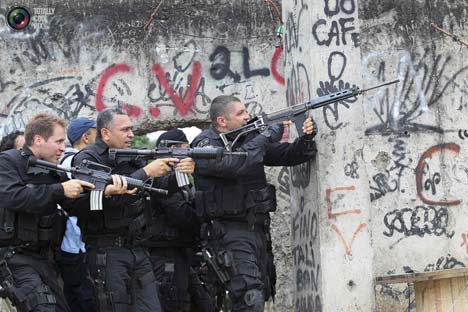 The
reality: police attack the favela
Jacarezinho during the occupation of
the Complexo do Alemão, 24
November 2010. As the motion of the
SEPE-RJ, introduced by the CLC,
demanded: Mobilize the working class
to throw the troops out of the Rio
slums and out of Haiti!
The
reality: police attack the favela
Jacarezinho during the occupation of
the Complexo do Alemão, 24
November 2010. As the motion of the
SEPE-RJ, introduced by the CLC,
demanded: Mobilize the working class
to throw the troops out of the Rio
slums and out of Haiti!(Photo: Sérgio Moraes/Reuters)
It is a truism to say that there is no solution to the problems of crime and police violence under capitalism. Any social democrat or bourgeois sociologist will say it. The question is, what conclusion is drawn from this? After militarized police murdered 30 people in a massacre in the Baixada Fluminense (an impoverished working-class region outside of the city of Rio) in 2005, the worst slaughter in the state’s history, when calls were raised to “dissolve all the repressive bodies” (put forward by the sociologist Luis Mir) and for the “extinction of the militarized police and the formation of another public security agency of a strictly civilian and technical character” (put forward by the Movement for Land, Work and Freedom, a tendency inside the PSOL), we insisted on the need to “Mobilize the working people for workers and peasants self-defense” (“El Brasil de Lula – Tierra de masacres” [Lula’s Brazil: Land of Massacres],” El Internacionalista No. 5, May 2005):
“In situations such as presently prevails in Brazil, when the urban and rural working people confront private militias of the employers and death squads, it is necessary to raise to the mass organizations of the exploited the call to form workers and peasants self-defense groups.”
Noting how an unarmed population aids violent criminals and murderous police and military, we called to fight against any arms control law. Stressing the need to combine mobilization in the factories and the bairros, we pointed to the important petrochemical and metalworking sectors in the region, and also to the presence of the teachers union, the SEPE-RJ:
“With a class-struggle leadership, it would be possible to organize working-class self defense in the Baixada Fluminense and the city of Rio. But this requires a political struggle against the pro-capitalist labor bureaucracy subordinated, directly or indirectly, to the popular front.”
This bureaucracy is not limited to the now pro-government CUT, or to even more right-wing labor federations such as Força Sindical. The leaders of Conlutas, of SEPE-RJ and of the health workers union Sinsprev-RJ – that is, the PSTU and PSOL – and of the Intersindical (led by the PSOL) are also intransigently opposed to independent action by the working people, seeking to place their struggles at the tail end of the capitalist state, in this case through support for the military firemen and police “in struggle.” (When the PSTU refers to “self-defense associations” it is in order to ask permission from the state to “protect ourselves against bandits,” not from attacks by the police.) In reality, these sectors of the left are making a political bloc with other bourgeois sectors in a substitute “militarized popular front.” In order to combat the whole of the bourgeoisie and attack the economic bases of the militias, it is necessary to put forward a program of transitional demands – including a massive plan of public works under workers control, notably constructing millions of houses; and fighting unemployment by shortening the workweek with no loss in pay – that point to the expropriation of capital through socialist revolution. We also demand the cancelling of all laws criminalizing or regulating the use or sale of drugs: Down with the “war on drugs,” which serves as a cover for the class war against working people, blacks and the poor, particularly in the impoverished neighborhoods of the favelas and morros, which serve as a training ground for Brazilian troops who murder the poor people of Haiti.
Above all, in order to carry out a revolution it is indispensable to have a deep knowledge and understanding of the nature of the bourgeois state. Throughout Latin America there has been much confusion about the relation between the police and the workers movement. At the end of September 2010, parts of the left in Ecuador supported a police mutiny, arguing that they were other “workers” threatened by the bourgeois populist government of Rafael Correa, when in fact this action by the police was linked to a coup attempt by sectors of the Armed Forces.
In Brazil, the equating of the police and workers comes from the corporatist tradition of Getúlio Vargas’s Estado Novo (New State), and more recently from the Workers Party that considers all state employees to be “public servants.” At bottom, both support to “strikes” by police and militarized firemen and proposals for the “democratization/demilitarization” of these corps are derived from the social-democratic conception of the supposed “neutrality” of the state, which has become the registered trademark of the PT which claims to “govern for all” – that is, treating as equals the rich and poor, as if there were no social classes. This is the opposite of the Marxist understanding that the state is an instrument of the rule of capital for the repression of the exploited and oppressed.
The polemical struggle around the movement of the Rio firemen throws a sharp light on the fact that the great majority of Brazilian parties and groups who claim to be Trotskyist in reality are social democrats, whose perspectives are strongly influenced by their origins as tendencies within Lula’s PT. When they speak of “socialism with freedom and democracy” (PSOL), of a “democratic revolution” (as do the Morenoites of the PSTU, from Egypt to Brazil), or even when they reject that bourgeois-reformist vision (in the case of the ex-Morenoites of the LER), their perspectives are counterposed to the authentic Trotskyist struggle for socialist revolution. The controversy over the militarized firemen underscores anew the vital importance of building a revolutionary workers party based on the Trotskyist program of permanent revolution, which fights for a workers and peasants government. To carry out an agrarian revolution in the countryside or to defeat imperialism in Libya, to combat repression by Brazilian military forces in Haiti and in the morros and favelas of Rio, requires a revolutionary leadership to lead the working people in the struggle for workers power, and to extend the revolution throughout the Americas and into the entrails of the imperialist monster. ■
[1] A reference to the “Collor Out” movement in 1992 which backed by students, youth, labor and much of the bourgeois media succeeded in driving the conservative president Fernando Collor de Melo from office and subsequently impeaching him over a series of corruption scandals, freezing of bank accounts and runaway inflation.
[2]
The PSTU argues that there are
tensions between the low-paid sectors
of the militarized police and firemen
and the (much better paid) elite
troops of the BOPE. There was an
example of such a conflict in the favela
of Batan (in the western part of the
city of Rio) where journalists of O
Dia
were kidnapped and tortured in 2007.
The following year, right in the
middle of the publicity about the
parliamentary inquiry into the
militias, it was reported that a
corporal in the Shock Battalion and a
soldier in the militarize state police
threatened a lieutenant in the BOPE.
The reason: the latter had signed a
contract with NetServiço – a
company jointly owned by the Globo
Network of Roberto Marinho) and
Embratel (a subisidiary of Telmex,
owned by Carlos Slim, the third
richest man in the world) providing
broadband Internet access at “popular
prices.” The lower-rank militarized
policemen demanded “an explanation” of
this competition with their
extra-legal gatonet
service, which depends on access to
the signal of Sky Brasil, a company
owned by the same Globo Network and
Rupert Murdoch’s News Corporation. As
you can see, at bottom there was a
conflict between two “armed media
monopolies,” a sort of “public-private
partnership of a new type,” as one
commentator put it ironically.
|
Polemicizing against comrade Cecilia of the LQB/CLC at an important meeting of the SEPE-RJ teachers union, Miguel Malheiros of the PSTU (who was rejected by firemen when he called for their demilitarization during one of their demonstrations) made an decidedly infelicitous comparison between the mutiny of the firemen of Rio de Janeiro and the Revolta da Chibata (Revolt of the Whip). The mutiny by the militarized firemen in Rio included commanding officers and demanded equal prestige and salary with the militarized police and the elite Special Operations Battalion and National Security Force. In other words, they are asking for increased recognition and improved conditions, in order to better repress the poor black population with, shall we say, “softer” methods, using powerful water cannons or, on other occasions, using riot clubs and more lethal forms, such as high calibre firearms. The Revolt of the Whip, on the other hand, was directed against the officers, so much so that the unit commander and three other officers were killed when they disobeyed orders from those led by the “Black Admiral,” João Cândido, a seaman. The Revolta da Chibata occurred mainly in order to eradicate the punishment of sailors by whipping, a leftover from slavery which persisted in the Brazilian Navy. Whipping had already been abolished in 1890 after the proclamation of the republic in Brazil, which took place in 1889, the year after slavery was abolished. Yet in order to provide sadistic pleasure to the white officers nostalgic for the beatings of black slaves in the public squares, the government of Hermes da Fonseca placed this instrument of torture in the hands of the Navy command. Moreover, the mutineers against the whip were recruited by force and in their great majority were black, assigned to exhausting manual labor on board the ships. None were involved in massacres or murders of the poor, as around 20% of the Corps of Firemen are (through their participation in the militias in the hillside slums of Rio de Janeiro), who are voluntary recruits trained in military/police repression. Even the events which inspired the 1910 revolt had a very different ideological content than those motivating the present-day militarized firemen of Rio. The Revolt of the Whip was inspired by the British workers movement (Chartism) and mainly by the Revolt of Battleship Potemkin in Russia, which took place after “Bloody Sunday” in January 1905, when the tsar ordered the shooting of thousands of striking workers. Then in June 1905, seamen on the battleship ferociously and justifiably punished the commanders of the warship due to the horrible working conditions and starvation rations on board. They also refused to continue the war against Japan, which had produced more than 5 million casualties among the Russia population in the context of the 1905 Revolution (the “dress rehearsal” of the Russian Revolution of 1917, as Lenin put it). As
one can see in comparing the
two mutinies (and not
“strikes”), the mutineers led
by the Black Admiral did not
call for more impressive
warships with powerful cannons
of higher calibre, or to use
water cannon on the
population, as the militarized
firemen do against strikers
and the population. They also
did not shoot to kill, as the
militarized firemen do, when
they participate in the
occupation of the hillside
slums along with the Special
Operations Battalion and Shock
Troops of the militarized
state police, the National
Security Force or other
sectors of the armed fist of
the capitalists. The Revolt of
the Whip was directed against
the officer corps, whereas the
leaders of the militarized
firemen of Rio hailed the
creation of a Secretariat of
Civil Defense headed by the
commander of the Corps of
Militarized Firemen as a
“great victory.” |
To contact the Internationalist Group and the League for the Fourth International, send e-mail to: internationalistgroup@msn.com
